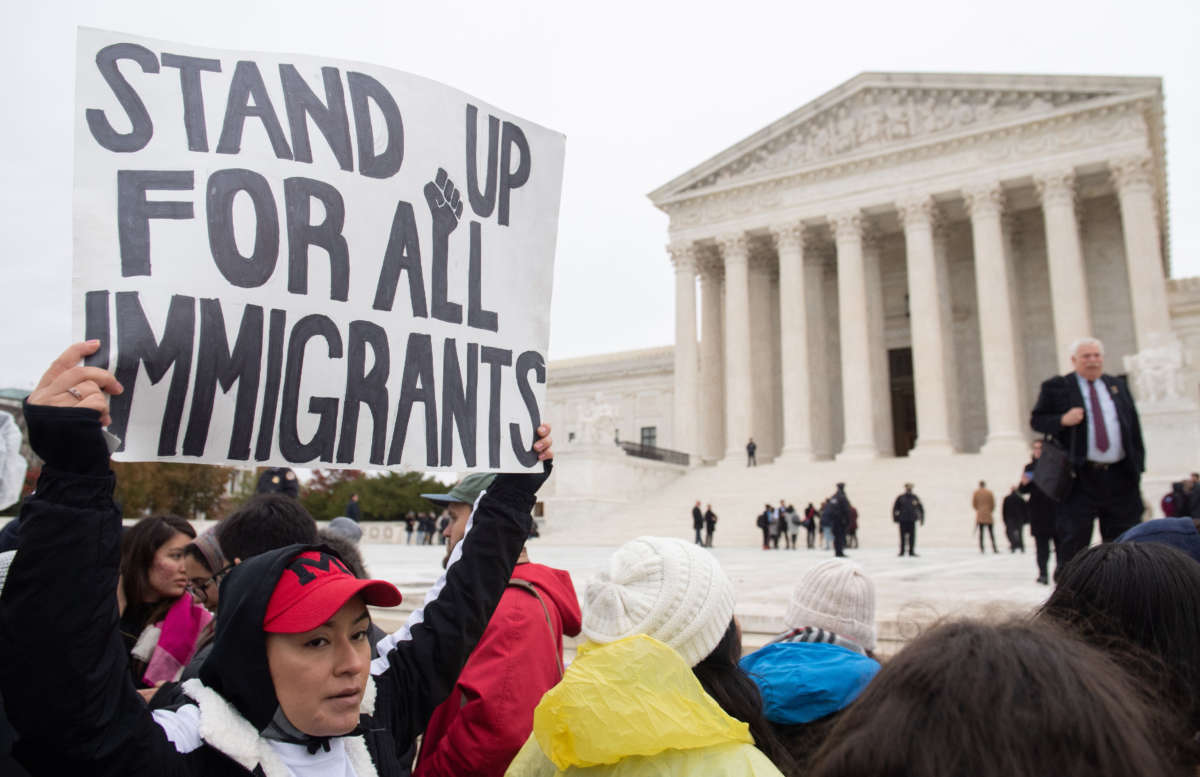Truthout is a vital news source and a living history of political struggle. If you think our work is valuable, support us with a donation of any size.
The Biden administration announced on Tuesday that it would no longer defend a controversial Trump-era rule that sought to restrict immigration to the United States on the possibility that individuals may at some point utilize public health benefits upon arrival.
The expansion of the “public charge” rule by the previous administration would have created extreme barriers for many to enter the U.S. if immigration officials had reason to believe individuals would become dependent upon noncash benefits, including health care, food stamps or housing assistance, that are available to U.S. residents facing economic hardships.
Legal challenges have limited the use of the rule since it was established in the fall of 2019. The Department of Justice, joined by other executive departments, notified the Supreme Court this week that it would no longer seek to defend the rule, and had come to an agreement with plaintiffs who were suing to stop its implementation.
The court had announced earlier this year that it would hear arguments on the public charge rule, but said this week it would no longer do so as the Biden administration had said that it would be dropping the matter.
Under the proposed rule, a person could be deemed a public charge concern based on several factors, including their age, health, education, financial resources and employment history. If it was believed that a person would need any federal assistance for a period of 12 months over the course of the three years immediately following their entry into the U.S., immigration officials could deny them entry, or if they were already in the U.S., the ability to apply for a change in status to permanent residency.
Earlier this year, President Joe Biden signed an executive order directing federal agencies to review the rule, a sign that the White House would seek to dismantle it sometime in the near future. The Department of Homeland Security (DHS) said in a statement on Tuesday that defending the Trump rule — which many have equated to a “wealth test” — “is neither in the public interest nor an efficient use of limited government resources.”
Several immigrant rights organizations, including Make the Road New York, praised the decision by the Biden administration to no longer defend the rule in federal court cases.
“The Biden Administration has rightly withdrawn the government appeals of appellate court decisions enjoining the Trump DHS’s public charge rule, clearing the way at last for this unlawful rule to no longer be enforced,” a joint statement from several immigrant rights groups said.
“This rule invited arbitrary, biased decision making,” that statement further declared. “And because of the public charge rule, immigrant families have been living in fear of using essential benefits like healthcare, despite serving as frontline workers who have been among those hardest hit by COVID-19.”
Several criticisms had been levied against the public charge rule change prior to this week’s announcement. In an op-ed published on Truthout after the Trump administration made the change official, Talila A. Lewis, an attorney, organizer and educator who focuses on the links between racism, classism, ableism and structural inequity, derided the decision as unnecessarily harmful.
“U.S. public charge policies are yet another cruel embodiment of the country’s racist, ableist and classist history and present that must be told,” Lewis wrote at the time. “These laws disproportionately harm people who already face compounded oppression, and many of these people are fleeing economic, political or environmental turmoil caused by the U.S. government.”
Freelance journalist Sasha Abramsky agreed with many of Lewis’s claims, writing in his own op-ed for Truthout that the rule change would have led to disastrous outcomes for many.
Implementation of the rule change would have “allow[ed] immigration officers to decide that a visa applicant might at some point become a burden,” Abramsky wrote in 2019. “That’s not simply re-stating an existing rule; it’s using that rule as cover for a much broader, more pernicious anti-immigrant agenda.”
A terrifying moment. We appeal for your support.
In the last weeks, we have witnessed an authoritarian assault on communities in Minnesota and across the nation.
The need for truthful, grassroots reporting is urgent at this cataclysmic historical moment. Yet, Trump-aligned billionaires and other allies have taken over many legacy media outlets — the culmination of a decades-long campaign to place control of the narrative into the hands of the political right.
We refuse to let Trump’s blatant propaganda machine go unchecked. Untethered to corporate ownership or advertisers, Truthout remains fearless in our reporting and our determination to use journalism as a tool for justice.
But we need your help just to fund our basic expenses. Over 80 percent of Truthout’s funding comes from small individual donations from our community of readers, and over a third of our total budget is supported by recurring monthly donors.
Truthout’s fundraiser ends tonight! We have a goal to add 122 new monthly donors before midnight. Whether you can make a small monthly donation or a larger one-time gift, Truthout only works with your support.
